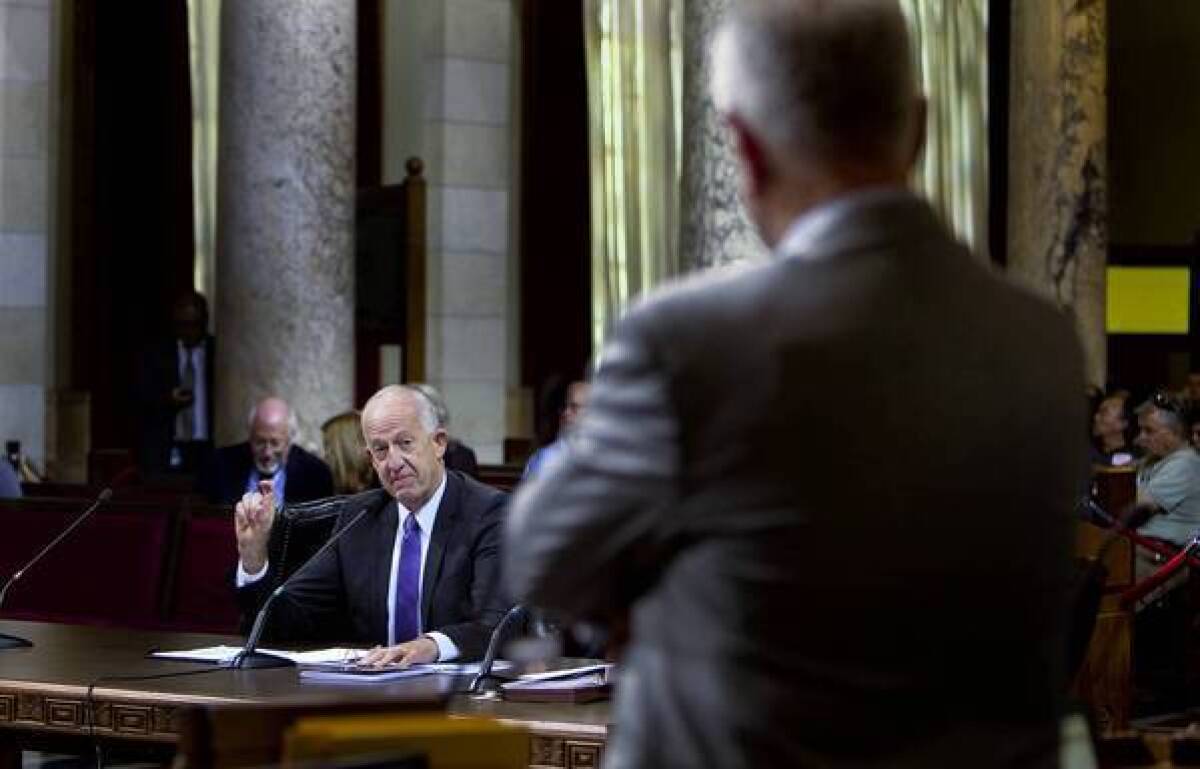L.A. council members laud DWP contract proposal scorned by Garcetti

- Share via
One day after Los Angeles Mayor Eric Garcetti said he would not sign a proposed salary agreement with union employees at the Department of Water and Power, City Council members praised the deal while voicing fears of a strike if the talks fall apart.
During a four-hour hearing, DWP executives and the council’s top advisors gave a forceful defense of the proposed pact with International Brotherhood of Electrical Workers Local 18, saying it would keep a lid on pay raises until 2016 while making strides in addressing the utility’s retirement costs.
“This proposal is about progress, not perfection,” said City Administrative Officer Miguel Santana, who reports to both Garcetti and the council.
Backers of the agreement repeatedly raised the prospect of labor strife at the DWP if the council is forced to impose a contract on the workforce. Councilman Paul Krekorian warned that any job action would have an effect on efforts to spur economic development and attract new companies to the city.
“Presumably it would be a lot harder for those businesses to get started if we were facing or in the middle of a strike,” he said.
As council members reviewed the proposal, Garcetti moved to replace four of the DWP board’s five members, part of what he described as his effort to “shake up the status quo” at the utility. One of those new appointees, Sherman Oaks resident Jill Banks Barad, appeared at Friday’s meeting to complain that neighborhood councils had not been given enough time to review the deal.
“You are misreading the community if you rush through to ratify this,” she told the council.
Garcetti said Thursday he wants more in the deal that would allow the city to change work rules, including a provision that grants DWP employees higher wages when private contractors are hired by the utility. He is set to meet Saturday with council President Herb Wesson to discuss the agreement.
The mayor remains the only elected official at City Hall to criticize the agreement with the DWP union, which waged a fierce campaign against him during this year’s election.
At the end of Friday’s hearing, Councilman Felipe Fuentes, who heads the council committee that deals with the DWP, threw his support behind the agreement, saying it would rein in salaries and retirement costs. Councilman Tom LaBonge, while insisting he is not ready to vote, said he was “absolutely impressed” that the deal has zero raises for three years. Councilman Mitch O’Farrell promised to keep reviewing the proposal but said he was encouraged that the retirement age for future DWP workers will jump from 55 to 63.
“No proposal’s ever perfect. I would love to be able to do more, but the fact is there’s been a good-faith effort in negotiating for this contract over the last year and a half,” he said.
The council’s leadership has called for a vote on the agreement by Sept. 1, to ensure that a raise scheduled for Oct. 1 under the union’s existing contract does not go into effect. If the pact is ratified, that raise would be delayed three years.
Backers of the deal contend it will save $4 billion over 30 years, adjusted for inflation, with the biggest savings coming from the reduction in pension benefits for future DWP employees. With 2,800 workers eligible for retirement over the next four years, as much as one-third of the utility’s workforce could be replaced and put into a less expensive pension program, Santana said.
The DWP’s electricity rates have increased 33% since summer 2005. The utility is projecting electricity rate hikes of 6% to 8% every year for the next 20 years as it upgrades decaying infrastructure and shifts to greater reliance on renewable power, according to ratepayer advocate Fred Pickel.
Ron Nichols, the DWP’s general manager, said the projected savings from the new salary agreement would cut the size of the utility’s planned electricity rate increases by 2 percentage points by 2016. That statement didn’t reassure many of the neighborhood activists who showed up to criticize the DWP’s employee costs.
“We in the private sector are not getting paid that well,” said Joanne Yvanek-Garb, a member of the West Hills Neighborhood Council.
Others urged council members to do more to address overtime pay and the many side agreements that govern work rules at the DWP. “We have to have a better plan,” said Miriam Burbano, 40, of Koreatown. “This is the opportunity we have to look at those contracts.”
More to Read
Sign up for Essential California
The most important California stories and recommendations in your inbox every morning.
You may occasionally receive promotional content from the Los Angeles Times.












